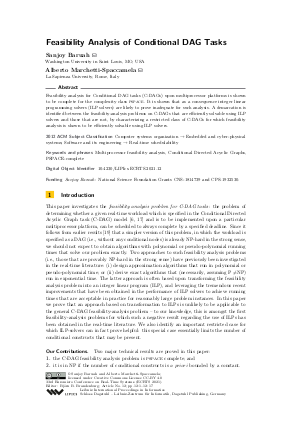Feasibility Analysis of Conditional DAG Tasks
Authors Sanjoy Baruah, Alberto Marchetti-Spaccamela
-
Part of:
Volume:
33rd Euromicro Conference on Real-Time Systems (ECRTS 2021)
Part of: Series: Leibniz International Proceedings in Informatics (LIPIcs)
Part of: Conference: Euromicro Conference on Real-Time Systems (ECRTS) - License:
 Creative Commons Attribution 4.0 International license
Creative Commons Attribution 4.0 International license
- Publication Date: 2021-06-30
File

PDF
LIPIcs.ECRTS.2021.12.pdf
- Filesize: 0.8 MB
- 17 pages
Document Identifiers
Subject Classification
ACM Subject Classification
- Computer systems organization → Embedded and cyber-physical systems
- Software and its engineering → Real-time schedulability
Keywords
- Multiprocessor feasibility analysis
- Conditional Directed Acyclic Graphs
- PSPACE-complete
Metrics
- Access Statistics
-
Total Accesses (updated on a weekly basis)
0Document
0Metadata
Abstract
Feasibility analysis for Conditional DAG tasks (C-DAGs) upon multiprocessor platforms is shown to be complete for the complexity class pspace. It is shown that as a consequence integer linear programming solvers (ILP solvers) are likely to prove inadequate for such analysis. A demarcation is identified between the feasibility-analysis problems on C-DAGs that are efficiently solvable using ILP solvers and those that are not, by characterizing a restricted class of C-DAGs for which feasibility analysis is shown to be efficiently solvable using ILP solvers.
Cite As Get BibTex
Sanjoy Baruah and Alberto Marchetti-Spaccamela. Feasibility Analysis of Conditional DAG Tasks. In 33rd Euromicro Conference on Real-Time Systems (ECRTS 2021). Leibniz International Proceedings in Informatics (LIPIcs), Volume 196, pp. 12:1-12:17, Schloss Dagstuhl – Leibniz-Zentrum für Informatik (2021)
https://doi.org/10.4230/LIPIcs.ECRTS.2021.12
BibTex
@InProceedings{baruah_et_al:LIPIcs.ECRTS.2021.12,
author = {Baruah, Sanjoy and Marchetti-Spaccamela, Alberto},
title = {{Feasibility Analysis of Conditional DAG Tasks}},
booktitle = {33rd Euromicro Conference on Real-Time Systems (ECRTS 2021)},
pages = {12:1--12:17},
series = {Leibniz International Proceedings in Informatics (LIPIcs)},
ISBN = {978-3-95977-192-4},
ISSN = {1868-8969},
year = {2021},
volume = {196},
editor = {Brandenburg, Bj\"{o}rn B.},
publisher = {Schloss Dagstuhl -- Leibniz-Zentrum f{\"u}r Informatik},
address = {Dagstuhl, Germany},
URL = {https://drops.dagstuhl.de/entities/document/10.4230/LIPIcs.ECRTS.2021.12},
URN = {urn:nbn:de:0030-drops-139433},
doi = {10.4230/LIPIcs.ECRTS.2021.12},
annote = {Keywords: Multiprocessor feasibility analysis, Conditional Directed Acyclic Graphs, PSPACE-complete}
}
Author Details
Funding
- Baruah, Sanjoy: National Science Foundation Grants CNS-1814739 and CPS-1932530.
References
- Clark W. Barrett, Roberto Sebastiani, Sanjit A. Seshia, and Cesare Tinelli. Satisfiability modulo theories. In Armin Biere, Marijn Heule, Hans van Maaren, and Toby Walsh, editors, Handbook of Satisfiability, volume 185 of Frontiers in Artificial Intelligence and Applications, pages 825-885. IOS Press, 2009. URL: https://doi.org/10.3233/978-1-58603-929-5-825.
-
Sanjoy Baruah. Feasibility Analysis of Conditional DAG Tasks is co-NP^NP-Hard (Why This Matters). In Proceedings of the Twenty-Ninth International Conference on Real-Time and Network Systems, RTNS '21, New York, NY, USA, 2020. ACM.

-
Sanjoy Baruah. Scheduling DAGs when processor assignments are specified. In Proceedings of the Twenty-Fifth International Conference on Real-Time and Network Systems, RTNS '20, New York, NY, USA, 2020. ACM.

-
Sanjoy Baruah, Marko Bertogna, and Giorgio Buttazzo. Multiprocessor Scheduling for Real-Time Systems. Springer Publishing Company, Incorporated, 2015.

-
Sanjoy Baruah, Vincenzo Bonifaci, Renato Bruni, and Alberto Marchetti-Spaccamela. Ilp-based approaches to partitioning recurrent workloads upon heterogeneous multiprocessors. In Proceedings of the 2016 28th EuroMicro Conference on Real-Time Systems, ECRTS '16, Toulouse (France), 2016. IEEE Computer Society Press.

-
Sanjoy Baruah, Vincenzo Bonifaci, and Alberto Marchetti-Spaccamela. The global EDF scheduling of systems of conditional sporadic DAG tasks. In Proceedings of the 2014 26th Euromicro Conference on Real-Time Systems, ECRTS '15, pages 222-231, Lund (Sweden), 2015. IEEE Computer Society Press.

-
Sanjoy Baruah, Vincenzo Bonifaci, Alberto Marchetti-Spaccamela, Leem Stougie, and Andreas Wiese. A generalized parallel task model for recurrent real-time processes. In Proceedings of the IEEE Real-Time Systems Symposium, RTSS 2012, pages 63-72, San Juan, Puerto Rico, 2012.

- Sanjoy K. Baruah, Vincenzo Bonifaci, Renato Bruni, and Alberto Marchetti-Spaccamela. ILP models for the allocation of recurrent workloads upon heterogeneous multiprocessors. Journal of Scheduling, December 2018. URL: https://doi.org/10.1007/s10951-018-0593-x.
-
Slim Ben-Amor. Multicore Scheduling of Dependent Tasks with Probabilistic Execution Times. PhD thesis, Sorbonne Université, 2021.

-
T. H. Cormen, C. E. Leiserson, R. L. Rivest, and C. Stein. Introduction to Algorithms. MIT Press, third edition, 2009.

-
Jose Fonseca, Vincent Nelis, Gurulingesh Raravi, and Luis Miguel Pinho. A Multi-DAG model for real-time parallel applications with conditional execution. In Proceedings of the ACM/ SIGAPP Symposium on Applied Computing (SAC), Salamanca, Spain, April 2015. ACM Press.

-
Robert A. Hearn and Erik D. Demaine. Games, puzzles and computation. A K Peters, 2009.

-
Klaus Jansen. Analysis of scheduling problems with typed task systems. Discrete Applied Mathematics, 52(3):223-232, 1994.

-
R. Karp. Reducibility among combinatorial problems. In R. Miller and J. Thatcher, editors, Complexity of Computer Computations, pages 85-103. Plenum Press, New York, 1972.

-
Jing Li, Abusayeed Saifullah, Kunal Agrawal, Christopher Gill, and Chenyang Lu. Analysis of federated and global scheduling for parallel real-time tasks. In Proceedings of the 2012 26th Euromicro Conference on Real-Time Systems, ECRTS '14, Madrid (Spain), 2014. IEEE Computer Society Press.

- Y. S. Li and S. Malik. Performance analysis of embedded software using implicit path enumeration. IEEE Transactions on Computer-Aided Design of Integrated Circuits and Systems, 16(12):1477-1487, 1997. URL: https://doi.org/10.1109/43.664229.
-
Alessandra Melani, Marko Bertogna, Vincenzo Bonifaci, Alberto Marchetti-Spaccamela, and Giorgio Buttazzo. Response-time analysis of conditional DAG tasks in multiprocessor systems. In Proceedings of the 2014 26th Euromicro Conference on Real-Time Systems, ECRTS '15, pages 222-231, Lund (Sweden), 2015. IEEE Computer Society Press.

-
L. Stockmeyer. The polynomial-time hierarchy. Theoretical Computer Science, 3:1-22, 1976.

-
J. Ullman. NP-complete scheduling problems. Journal of Computer and System Sciences, 10(3):384-393, 1975.

- Reinhard Wilhelm. Why AI + ILP Is Good for WCET, but MC Is Not, Nor ILP Alone. In Verification, Model Checking, and Abstract Interpretation, pages 309-322, 2004. URL: https://doi.org/10.1007/978-3-540-24622-0_25.
-
C. Wrathall. Complete sets and the polynomial-time hierarchy. Theoretical Computer Science, 3:23-33, 1976.

-
Houssam-Eddine Zahaf, Nicola Capodieci, Roberto Cavicchioli, Marko Bertogna, and Giuseppe Lipari. The HPC-DAG task model for heterogeneous real-time systems. IEEE Transactions on Computers, pages 1-1, 2020.

